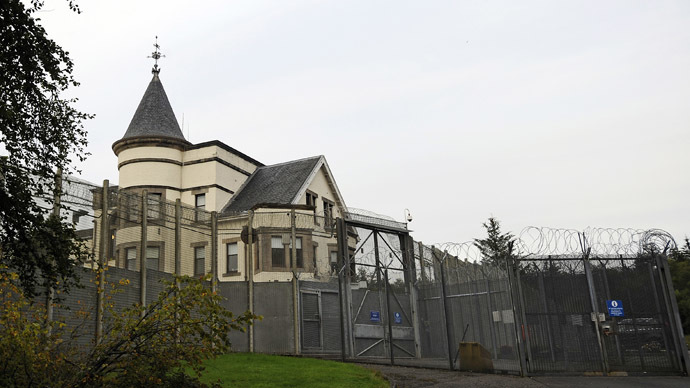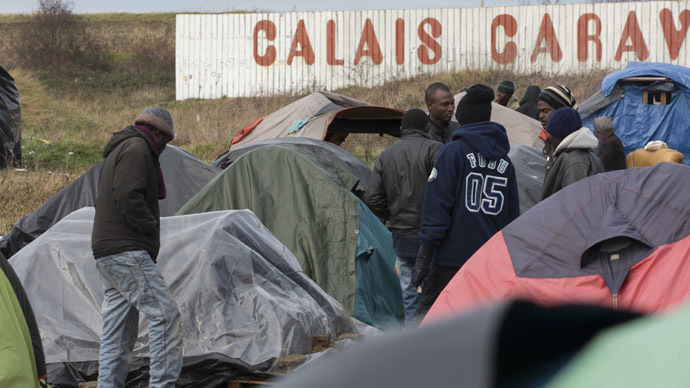‘Govts wash hands of asylum seekers’ lives’

European governments show a complete disregard for the human rights of asylum seekers and are not prepared to take responsibility for people who are moving for a better life to a different country, investigative reporter Liam O'Hare told RT.
RT:The latest report by the Institute of Race Relations outlines what it describes as the ignorance of authorities towards migrants' lives. How should these people be handled, as they turn up with no money and no plans?
Liam O'Hare: This is a very clear fact that the authorities in the UK show a complete disregard for migrants and asylum seekers when they arrive there. And this report helps to illustrate that. Now I think the report is only the tip of the iceberg in terms of how many deaths there have been, and have been related to the conditions people are living in. I’m in touch on a regular basis with asylum seekers in Dungavel detention center in Scotland. And they phoned me up to tell me that there are people with very serious health problems that are not being taken seriously by the UK Home Office. So I think it’s very obvious that there is a complete disregard for human rights of the asylum seekers. Britain has to answer the question whether they believe in human rights or not, and if they do then they need to treat the most vulnerable people in society with concern.

RT:Where's the balance in making sure immigrants are dealt with humanely and with dignity while not sending a message to others abroad that their lives will be sorted out for them if they make the trip?
LH: I think Britain has a historical responsibility to a lot of people as well. That’s something that is often forgotten. When you look at the world, when you look at conflicts zones, often Britain has created these conflicts in the first place. So it’s awfully hypocritical of the UK government to create a lot of conflicts in the world on the one hand when the other hand is trying to wash their hands of this. Britain does have a responsibility to people. And Britain is very quick to assume the mantle of believing in human rights, but the evidence certainly from the last report and the evidence from what the people have spoken in detention centers tell a very different story.
RT:What about the limbo situation in Calais? France says, “Britain's the destination, so their problem”; Britain says, “it's your port, and they got into your country.” Who should be sorting this out?
LH: I think both are responsible ultimately. There is no doubt that it’s an attitude from many European governments of disregard towards asylum seekers. The British government is notorious for it as well. But I think in France there are things to be pointed there as well. It’s symbolic of a wider problem, and symptomatic of that that they all are trying to wash their hands of human lives essentially, human lives of people who are moving or trying to have a better life moving to a different country. And the attitude and the problem in Calais is symptomatic of something a lot bigger, and these governments are not prepared to take on the responsibility, which is the key for the most vulnerable people that come and seek for a better life.
RT:Brussels wants immigrant-processing centers outside the EU. It's a first for them and a move to stem the tide of people across the Mediterranean. Do you think it will work?
READ MORE: Calais officials to evict migrants, bulldoze shanty town
LH: I don’t think so. I think the most effective policy would be a humane one. A humane policy that treats people with dignity and respect .... Because I think the hypocrisy that exists in terms of human rights is quite astounding with a lot of European countries. What you’ve got is a situation in Britain especially where people are being held in detention for indefinite amounts of time. And it actually costs the government a lot of money, a lot of public expenditure when I think it would be less so if they actually treated people with dignity and then hold people in detention centers. So the problem is a lot bigger than any quick fix solutions, like the one that has been suggested, is not going to get to the root of these issues.
‘High time to discuss migration issue in Europe’
Port of Calais has become a major destination for asylum seekers and migrants who are trying to reach Britain. This issue has become critical for the French government. Deputy Mayor of Calais Philippe Mignonet shared his opinion on the issue with RT.
“I think it’s already affecting French and [British] relations. England is saying it is a French problem while it is not a French problem. We all know the migrants want to go to England for the ones who are there. They want to go to England,” said Mignonet.
“Calais is not the destination, Calais is not the target, the target is England. And they want to go to England. And I wish them good luck for that. Everybody has dreams. I wish good luck to everybody who has got a dream,” he added.
The deputy mayor said that “if the border is moved back of course no controls will be done in Calais; everything will be done in Dover. England will see how it is difficult to manage that situation.”
He argues that “it is not only a fact to say: ‘We don’t want immigration in England, it is a Calais responsibility, it is a French responsibility.’ No, the responsibility belongs to everybody in Europe.”
“It’s about time to work on that subject now, but that needs courage from the politicians that needs to have the ministers around the table,” Mignonet told RT.
“In that room you have 57 seats- they all can come here. Calais is probably one of the best places to talk about it. Mr. Cameron has never come; we never saw any minister here. Why? Rather than blaming, come and see the reality,” he added.
The statements, views and opinions expressed in this column are solely those of the author and do not necessarily represent those of RT.
The statements, views and opinions expressed in this column are solely those of the author and do not necessarily represent those of RT.












